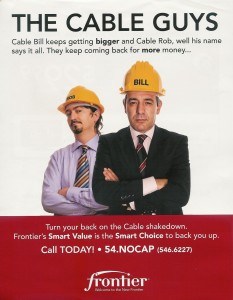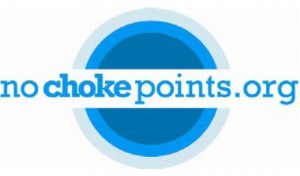 While residential customers face the threat of Internet Overcharging schemes designed to ration their use of the Internet with excessive pricing combined with usage limits, business customers are finding the opposite: providers rolling out several new innovative services designed to control costs and increase broadband flexibility.
While residential customers face the threat of Internet Overcharging schemes designed to ration their use of the Internet with excessive pricing combined with usage limits, business customers are finding the opposite: providers rolling out several new innovative services designed to control costs and increase broadband flexibility.
Verizon Business‘ Ethernet Virtual Private Line Service customers, who enjoy enormously fast speeds over a fiber-based network, will now have the ability to customize their bandwidth on-demand, through an online control panel.
Verizon EVPL Dynamic Bandwidth enables customers to raise or lower their broadband speeds as needed, and pay for their broadband service based on the speed they select. The service is designed to maximize savings for businesses that have a periodic need for higher bandwidth, but don’t feel justified paying for a higher tier of service that will go unused at other times. A customer accesses an online control panel, reviews pricing for different levels of speed, and then selects the option that best meets their needs.
Customers can raise or lower both the upload and download speeds once every 24 hours. The requested capacity is provided within 60 minutes, and the control panel lets customers schedule bandwidth needs in advance.
The Dynamic Bandwidth service supports speeds between 1Mbps all the way up to 1000Mbps, depending on available facilities in your area.
“There is an insatiable hunger for bandwidth as technologies such as video transmission become more widely adopted by enterprises,” said Blair Crump, worldwide president of sales with Verizon Business. “Our self-service dynamic bandwidth capability allows our EVPL and Private IP customers to make the most of their networks, at their convenience.”
David Hold, senior analyst, network services with Current Analysis, said: “Verizon Business is delivering a unique value proposition to the Ethernet services market with their new dynamic bandwidth capability. With the proliferation of sophisticated, bandwidth-intensive applications, most organizations are demanding greater network capacity, and this new capability will help customers improve their return on investment in EVPL by only paying for greater speed when needed.”
Speed-based tiered pricing is familiar to consumers, and does not raise the same level of concern that consumption-based billing schemes do. It is based on the premise that those heavy users of broadband will naturally gravitate towards higher speed, more expensive tiers of service to enjoy faster speeds. The provider’s premium pricing also guarantees premium profits.
While residential customers bear the brunt of Internet Overcharging experiments based on data consumption, most business-class customers curiously escape such limits and fees. Indeed, if the rationale for such pricing is based on demands placed on the network infrastructure, business customers, who face pricing commensurate with their anticipated higher usage, should be the natural first candidates for experimentation, not the ones exempted from it.
Verizon Business’ new speed based tiering demonstrates that there is money to be made providing customers with their choice of speed, without alienating them with unwarranted usage limits and the penalties and fees that follow those who exceed them.


 Subscribe
Subscribe

 The NoChokePoints Coalition has a point. They are a coalition of public interest groups and providers like British Telecom and Sprint-Nextel that are upset with monopolistic pricing for high speed broadband lines. Verizon and AT&T “control the broadband lines of almost every business in the United States” the coalition states, and “generates a profit margin of more than 100% for the controlling phone companies.”
The NoChokePoints Coalition has a point. They are a coalition of public interest groups and providers like British Telecom and Sprint-Nextel that are upset with monopolistic pricing for high speed broadband lines. Verizon and AT&T “control the broadband lines of almost every business in the United States” the coalition states, and “generates a profit margin of more than 100% for the controlling phone companies.”